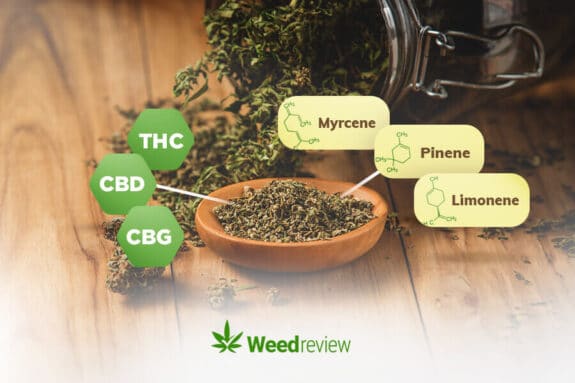
THC – Exploring the Benefits, Uses, and Legality of Tetrahydrocannabinol

Table of Contents
THC is a chemical found in the cannabis plant that can temporarily affect a person’s mind. It can be consumed by smoking or eating edibles. Although people use it for fun, studies suggest that THC could help ease different health issues.
In Thailand, where the government is trying to understand how to regulate cannabis, it’s essential to know about THC and how to use it safely. This article will provide an easy-to-use guide on THC, explaining its benefits, legality, and common side effects.
THC made easy: A quick intro
The cannabis plant contains over 80 naturally-occurring chemicals called cannabinoids, which interact with the human body to cause several effects. Two of the most well-known are CBD and THC.
THC is a strong psychoactive substance that causes you to feel and think differently.
THC affects your body and mind by connecting to specific parts of the brain and nervous system (known as cannabinoid receptors), altering how messages are sent and received. This can lead to various physical and emotional effects.
Where does THC come from?
There are two types of cannabis – marijuana and hemp.
Hemp has more CBD than THC, while marijuana has more THC. Growers across the world – with the wonders of genetics and technology – can grow marijuana plants with specific amounts of THC, terpenes, and CBD in them.
The quality of the flower also depends on how skilled and passionate the grower is. While any weed can make you high, smoking good quality weed is much better than smoking bad quality weed. Knowing the difference can make your cannabis experience more enjoyable.
Legality of THC in Thailand
Is weed legal in Thailand? The answer is complex.
In short, weed is legal – but the legal landscape is evolving, and the rules are subject to change.
Legally, cannabis is no longer a narcotics substance. It can be grown and possessed. Its sales are supposed to come under medicinal marijuana, but it is not enforced strictly. You can walk into any weed shop and buy the strain of your choice. You can smoke it at the cafe (if allowed) or at home, but not in public. You can travel with cannabis anywhere inside the country via trains/flights. You cannot travel with it internationally.
The same is true for edibles, although food items and beverages containing more than 0.2% THC are to be regulated. Again, this is not enforced yet.
Stronger products like cannabis THC oil extracts are also available. They need a prescription from a cannabis doctor at state-approved medical marijuana clinics.
Medical benefits of THC
Although THC has been a topic of controversy, it has gained notable attention due to its therapeutic benefits. Delta-9-tetrahydrocannabinol has potential medical uses, as listed below.
More studies are needed to understand how it works and its long-term effects.

Pain Relief
THC may help reduce pain and inflammation in the body. It has been shown to be effective in reducing chronic and neuropathic pain associated with conditions like fibromyalgia, cancer, and neuropathy. It may also have fewer side effects and addiction tendencies when compared to traditional painkillers.
Appetite Stimulation
THC can boost appetite, making it beneficial for individuals with conditions that cause a lack of appetite or weight loss, such as cancer or HIV/AIDS. Studies show that THC can increase food intake by activating specific receptors in the brain responsible for hunger.
Nausea and Vomiting
THC is effective in reducing nausea and vomiting in patients undergoing chemotherapy. Research suggests that THC can help ease these symptoms by binding to receptors in the brain and regulating the neurotransmitters responsible for these processes.
Sleep
THC may have sedative effects that can promote better sleep. Studies suggest that THC can increase the amount of time spent in the deep sleep stage, leading to more restful and restorative sleep. However, long-term use of THC may lead to disrupted sleep patterns and other negative side effects.
Mood and Anxiety
THC can affect your mood, making you feel happy and relaxed. It may also cause feelings of anxiety and paranoia in higher doses, especially in people who are sensitive to its psychoactive effects. That said, THC has anxiolytic properties, making it an option worth researching further for mental health.
Cancer
THC may have anti-tumour properties and may be beneficial in the treatment of certain types of cancer. Studies indicate that THC may be able to cause the death of cancer cells and inhibit the growth and spread of tumours. It has already proven effective in managing the side effects of cancer treatments and providing relief to cancer patients.
Neuroprotective Effects
THC may have neuroprotective effects that can help protect the brain from damage and degeneration. Studies suggest that THC may help reduce inflammation in the brain, which can be beneficial in treating diseases such as Alzheimer’s and Parkinson’s. Additionally, THC may stimulate the growth of new brain cells, which can be beneficial in treating conditions that affect cognitive function.
THC research in Thailand
There is growing interest in the medicinal use of THC in Thailand, supported by recent research trends:
- The Government Pharmaceutical Organisation (GPO) conducted a study to research the effect of cannabis extract (THC: CBD,1:1) on patients suffering from multiple sclerosis. It found that the extract can help treat spasticity in patients.
- A medical cannabis clinic in Lampang Hospital also noted that cannabis could improve the quality of life and decrease pain. It even recommended pursuing cannabis as an alternative medication for particular patients.
- The GPO and DTAM (Department of Thai Traditional and Alternative Medicine) are actively researching the health benefits of cannabis.
How to take THC
Depending on your preferences and needs, there are several ways to consume THC.
- Smoking: Inhaling dried flowers through a pipe, bong, or rolled joint provides a rapid onset of THC effects lasting a few hours. However, it may not be suitable for everyone due to lung irritation. Common examples of these flowers are Jack Herer, Northern Lights, and Gorilla Glue.
- Edibles: Cannabis-infused food products, such as gummies, chocolates, and baked goods, provide a discreet and easy way to take THC. The effects take time to hit, but they last longer than smoking. Accurate dosing is needed, as taking a lot can result in unpleasant effects.
- Topicals: Cannabis-infused creams and lotions are applied directly to the skin for localised pain relief.
- THC Oils: Concentrated extracts that can be consumed orally or mixed with food and drink, offering precise dosing control. You can use it topically for pain relief, but it’s important to start with a low dose and gradually increase it to avoid negative effects.
How does it feel to take THC
When you consume THC, you can experience a range of effects:
- Euphoria and relaxation
- Increased sociability
- Enhanced sensory experiences (food tastes better, music sounds more lively, colours appear more vivid)
- Increased appetite
- Distorted sense of time
- Altered sense of reality
- Laughter
THC can make you feel more spaced out or thoughtful than usual. It can also make it easier or difficult to fall asleep. Remember, it affects everyone differently depending on their dose, body metabolism, and how they take it.
Adverse effects
Common side effects of marijuana include:
- Anxiety
- Paranoia
- Dizziness
- Confusion
- Impaired memory and coordination
- Increased heart rate
- Dry mouth
It’s worth noting that these effects can vary in severity and duration. It’s always a good idea to start with a low dose and gradually increase it.
If the side effects are too serious, please seek emergency medical care.
Cannabis addiction
Weed has the potential to cause addiction. There are instances where users may develop marijuana use disorder.
Using marijuana a lot can make you need more and more to feel the same effect. Long-term use can hurt your thinking, motivation, and memory. If someone is addicted to marijuana, it can damage their work and personal life. They may also feel sick when they stop using it (withdrawal). That’s why it’s important to know the signs of cannabis addiction and seek help from professionals when needed.
Drug interactions
It’s crucial to be aware that taking THC can affect how other medications in your body work. This means that it’s essential to know which drugs may interact with THC, whether they were prescribed by a doctor or bought over the counter.
When THC is used with benzodiazepines or opioids, it can make you very sleepy or cause breathing problems. THC can also affect how your liver processes medications, which could lead to more side effects.
If you’re taking any medicines, it’s important to speak with your healthcare provider before using THC to avoid any potential risks.
Conclusion
To sum it up, THC can be helpful for things like pain, relaxation, and appetite. However, you need to be careful when using it and understand the risks, like getting addicted or having bad side effects.
Just like anything else, it’s important to use it responsibly. Ensure you learn about it and talk to a doctor before trying THC for medicinal reasons. With the right information, THC can be a good choice to improve your lifestyle.


